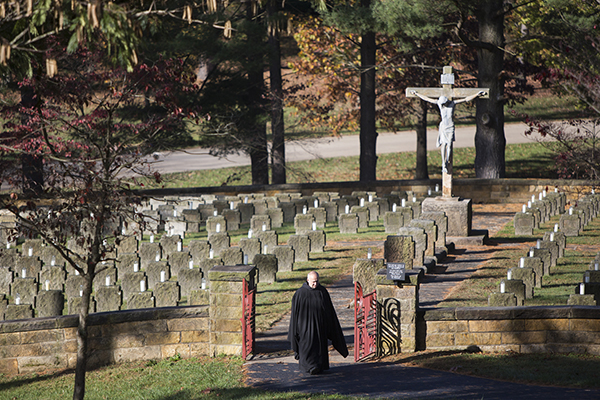Fear Nothing
Fr. Adrian Burke, OSB
Thursday, September 26, 2019

"Day by day remind yourself that you are going to die."
Rule of St. Benedict 4:47
The above text from the Rule of St. Benedict is sometimes more literally rendered, "Keep death daily before your eyes." Before thinking I've gotten morose and morbid in my middle years, let's think about how this admonition from the saint might be understood in a positive, Christian light.
Like St. Paul before him, Benedict thinks of death differently than society at-large does. In his first letter to the church of the Thessalonians, St. Paul teaches that whereas it is normal (and healthy, we’d say today) to grieve the loss of loved ones, we ought to remember that our faith in God has made available to us belief in bodily resurrection, so that [you] "may not grieve as others do who have no hope, for we believe that Jesus died and rose again; even so, through Jesus, God will bring with him those who have died" (1 Thes 4:13b-14). Christian belief must be rooted in God’s gift of faith, a capacity to rely on the supremely reliable One (God), and to trust in God’s promises.
The textual context of this verse from the Rule is the chapter entitled, “The Tools for Good Works.” In this part of chapter 4, Benedict reminds his monks that God is always present, aware of our comings and goings, our action or inaction regarding the pursuit of justice, goodness, and love.
As a “tool for good works,” the practice of “keeping death daily before our eyes” is presented as a kind of implement with which we toil faithfully in the “workshop” of monastic stability in community, building ourselves up to become wholly part of God’s kingdom, even here and now, and to be leaven for the world.
In Benedict’s view, the monastic community is where monks work in collaboration with God to form better selves, more loving and generous, more Christ-like images of God. To do this, we have to imagine the goal, like a sculptor imagining what he or she wants their sculpture to look like.
Michelangelo, a sculptor of enormous talent, when asked “how he does it,” was said to have replied that his task was essentially to free his subject from the surrounding marble; to chip away the parts of the marble block that don’t belong. As I see it, our task is to collaborate with grace to chip away at the attitudes and behaviors, attachments and fears, and all the stuff that doesn’t belong because it isn’t Christ-like.
To be a Christ-like disciple of Jesus, I need to be fully free from fear, even the mortal fear of death itself. Benedict knows we all begin with fear, fear of death, yes, but also fear of hell (punishment). The fully free Christian is one who fears nothing – not death, not punishment – because he or she is striving always to know Christ and to love God by loving neighbor as self. One who strives in this way has nothing to fear of judgment but can stand confident (hope-full) before Christ when he comes in glory (Eph 3:12).
So to remind myself every day that I will die is not morbid for a Christian; it is, on the contrary, an act of Christian faith and hope. Reminding myself daily that I will die one day allows faith to chip away at fear regarding death, even as I learn to see all things by the light of the Risen Lord. Such faith flowers in the Spirit’s gift of hope, confident that nothing life can send us, not even death, "will be able to separate us from the love of God in Christ Jesus our Lord" (Rom 8:31-39).